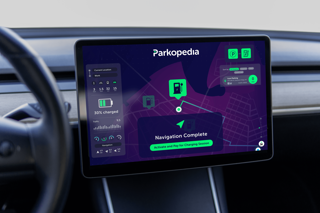Fleet managers have called on contract hire and leasing companies not to automatically pay and recharge parking fines incurred by company car and van drivers.
Members of ACFO, the fleet-decision-makers’ organisation, say that availability of technology - text and email - should enable contract hire and leasing companies to immediately notify customers when a Penalty Charge Notice or Parking Charge Notice (in respect of vehicles parked on private land) has been imposed on a driver.
A survey by ACFO in advance of its “Another Fine Mess?” seminar at the Henry Ford College, Loughborough, discovered that 48% of leasing companies automatically paid the fine and then recharged the cost to fleet customers with 86% adding an administration fee..
However, once a Penalty Charge Notice or Parking Charge Notice has been paid it cannot be appealed, the seminar sponsored by Ford and SAFO Europe, a fines management specialist, was told.
The British Vehicle Rental and Leasing Association (BVRLA) has estimated that its largest member companies handle around 13,000 fines a month.
Amanda Brandon, the BVRLA’s legal and policy executive, said that the administration process for the majority of leasing companies was “completely manual” with all correspondence by post meaning the clock was ticking in terms of the 28 days for drivers to pay or challenge the fine.
However, newly-elected ACFO chairman John Pryor questioned why leasing companies, who receive the fine as the registered keeper of a vehicle, could not use technology to notify clients that a charge had been incurred.
He said: “Leasing companies should improve their fine administration process. We know from our survey that some leasing companies give clients the option to pay or appeal, but it is clear that many don’t.
“A straight-forward text or email should be sent to the fleet manager informing them that a parking fine has been incurred, where and when. That would enable the fleet manager to identify the driver and respond within 24 or 48 hours as to whether the fine will be paid or appealed. It would be a more efficient process and a fairer service.”
Brandon told the seminar that the BVRLA was working with its members on the best way to make sure that Penalty Charge Notices and Parking Charge Notices were communicated to fleets as quickly as possible.
She said that future best practice could see the recommendation of email notification requiring a response from fleet mangers within 48 hours or fleets being notified of a fine by post and asked to respond within 14 days.
It also emerged in the ACFO survey that 86% of fleet manager respondents said their vehicle leasing supplier issued a fine administration fee - but 14% of fleet operators said their supplier levied no handling charge.
Among leasing companies charging an administration fee 50% charge between £20 and £30 per fine, according to respondents, although 11% said their supplier charged under £10 with the remainder saying it was £10 to £20.
Asked if it was possible for the BVRLA to encourage leasing companies to adopt a “standard charge”, Brandon said that under competition law that would be unlawful.
Fleets predicted to face rise in traffic offence fines
The number of fines relating to traffic offences incurred by company car and van drivers could escalate in the near future, the seminar heard.
The Highways Agency’s decision to replace payment at the Dartford Crossing with a new remote charging system from October 2014 is expected to result in a spate of penalty charge notices, Brandon told the seminar.
Instead of the current barrier payment system, drivers will be able to pay in advance or before midnight the day after using the crossing. Payment methods will include pre-pay accounts which qualify for discounted travel, online, by text, at retail outlets, over the phone or by post.
There is also expected to be a special fleet scheme, but details of how it will work have yet to be announced.
Brandon also warned fleet managers that the number of Penalty Charge Notices being issued could rise for a number of other reasons including:
- More bus lanes being introducing, particularly in towns and cities outside of London
- The planned 16th June increase in the London Congestion Charge from £10 to £11.50 with a £1 reduction for fleet scheme members
- The planned 2020 introduction by Transport for London of the London Ultra Emission Zone, which will almost certainly be based on the existing congestion charging zone. The key entry requirement is expected to be linked to Euro6 vehicle compliance standards for NOx.
Brandon said: “All could be reasons for future increases in the number of Penalty Charge Notices incurred by fleet drivers.”
All-new Ford Mondeo makes UK fleet debut at ACFO event
The all-new Ford Mondeo, which will go on sale by the end of 2014, made its UK fleet debut at the ACFO seminar.
Prices have yet to be revealed for the new Mondeo line-up, which will include a four-door hybrid electric saloon as well as a five-door hatchback and an estate.
Final details of the internal combustion engine line-up have yet to be released, but fleets will have a choice of 1.0-litre 125PS and 1.5-litre EcoBoost petrol engines and a 2.0-litre diesel unit with a choice of power outputs.
The new Mondeo will also see the industry debut of rear inflatable seatbelts, the first time the technology has featured on a production model.
Trim levels will be Style, Zetec, Titanium and Vignale and order books for the new Mondeo are due to open in September.
Claire Killick, Ford’s national fleet manager, said: “The all-new Mondeo is an important car for Ford and we are delighted to be able to show it to fleet managers for the first time at the ACFO seminar.”
Correctly worded employment contracts key to recharging fines to staff
Correctly worded contracts of employment are critical to enable employers to identify company vehicle drivers as responsible for a fine and then take action to recoup the cost and potentially take disciplinary action, according to Rebecca Lynch, partner, head of employment (joint) at law firm Gordon Dadds.
“If employers give staff a contract of employment with the right flexibility then they should not have a problem in identifying the driver responsible for the Penalty Charge/Parking Charge and enforcing their payment of the fine, which would normally be deducted from their pay, either in one lump sum or perhaps over time if the payment is large,” Lynch told the seminar.
Highlighting that it was a “red herring” that the identity of employees committing offences could not be provided to the authorities under the Data Protection Act, Lynch said: “It is a straight-forward process if companies have the right documentation in place and can prove that employees received it. If a driver has committed an offence, employers are obliged to pass on their details.”
Additionally, Philip Somarakis, partner and specialist road traffic and regulatory lawyer at Gordon Dadds and ACFO company secretary, urged fleet managers to: “Identify the driver and get the fine off your desk. Don’t take any flack about a driver’s rights.”
Lynch advised that employers communicated directly with drivers about any fines incurred and outlined two potential courses of action - the recouping of the cost of a fine plus any administration fee levied by the organisation or its leasing company and any further disciplinary action.
Written consent for the costs to be charged and deducted from wages/salary must either be contained within the signed employment contract or directly communicated separately by letter to employees which they have counter signed, advised Lynch.
Similarly, if further disciplinary action is to be taken the parameters and process must be communicated clearly and directly to employees.
When considering disciplinary action, perhaps if motoring fines have been incurred following a road crash or in the event of driving dangerously, Lynch said careful handling of the case was required particularly if staff had unfair dismissal rights on completion of two years of service.
“Employers should act reasonably throughout, ensure parity among all staff to avoid discrimination and should not apply policies inconsistently. Employers must ensure consistency and fair treatment of employees,” she said.
Lynch concluded: “If you have the contract of employment right you have a lot of options. The law is on your side and you can get your money back from employees. However, if allowing staff to repay costs over a period of time be aware of the implications if an employee leaves. Ideally employers should have in writing the fact that the whole balance is deductible on departure.”
Somarakis also warned fleet managers if receiving a Notice of Intended Prosecution in the event of a motoring offence having been committed by an employee not to give the form to the driver and ask them to respond.
“Companies quite often give drivers the Notice of Intended Prosecution and ask them to respond. That is a cardinal sin. Companies should complete and return the form to the authorities by recorded delivery.”
Finally, Somarakis said that if fleet managers were unable to instantly identify a driver that had incurred a fine - perhaps if they were at the wheel of a pool vehicle - then they must “turn detective”.
“Fleet managers must exercise reasonable diligence in identifying drivers through checking records - phone calls, emails and receipts, for example,” he said.
“Ultimately if you cannot identify a driver then a fleet manager must be able to satisfy a court that it was reasonable not to have a record of who was driving a vehicle at a specific time.”
Education programme required to end fines nightmare
Managing fines relating to parking and traffic offences can prove to be a legal, financial and HR administrative nightmare for fleet decision-makers and company car and van drivers prompting a leading expert to call for a major education campaign and perhaps even warnings letters to be issued for first offenders.
Caroline Sheppard, chief adjudicator, Traffic Penalty Tribunal for England and Wales, which decides appeals against parking, bus lane and moving traffic penalties issued by civil enforcement authorities in England (outside London) and Wales, told seminar delegates that the whole process was “messy”.
With separate organisations hearing appeals against Penalty Charge Notices in London, Scotland and Northern Ireland and a further body, the Parking on Private Land Appeals service hearing driver appeals against Parking Charge Notices issued when breaching rules governing parking on private land, Sheppard said: “It is no surprise that there is confusion as to what is going on and what the rules are because it really is a fine mess.”
Sheppard said she understood that a number of local authorities wanted to send “warning letters” to drivers, particularly first time offenders.
Figures reveal that about eight million parking-related Penalty Charge Notices are issued annually split equally between London and the rest of the country. In London about 1% of Penalty Charge Notices are appeals and about 0.5% across the rest of England and Wales. In relation to parking on private land 550-600 appeals are lodged per week across England and Wales with about half won.
Robert Toft, who has responsibility for data sharing, policy, freedom of information and police liaison at the Driver and Vehicle Licensing Agency (DVLA), said that it received “hardly any complaints” about registered keepers’ details being issued to public sector bodies but “quite a lot of complaints” about releasing data to the private sector.
The DVLA provides about nine million sets of registered keeper details to the public sector per year and about 2.2 million sets to the private sector. Toft said: “However, almost all media coverage relates to private parking schemes. People are more comfortable with the public sector using this information rather than the private sector.”
Shepard said: “We need a Government education campaign. The system, the process for appealing and who actually appeals is all very complicated.
“The reason why many appeals are not lodged is because it is all too complicated and bureaucratic.”
Parking fines, said a number of speakers, were hugely emotive for drivers, and Sheppard urged drivers who received a parking fine on their windscreen to provide photographic evidence if considering an appeal.
However, with so many fines being issued as a result of closed circuit TV detection and Automated Number Plate Recognition it can be many days or even weeks after the alleged offence before a driver is in receipt of a Penalty Charge Notice.
Meanwhile, the Traffic Penalty Tribunal for England and Wales is planning to launch a website that will help corporate organisations through the appeals process.
The “appeal online” website is being developed with the hope that it will be rolled out in January 2015 following tests with a number of local authorities. ACFO has been invited to join an advisory user board.
Sheppard said: “Corporate appellants will have access to a dashboard that will enable them to exchange views and information with the local authority that issued the Penalty Charge Notice. I expect it to speed up the whole appeals process and, indeed, with an exchange of evidence and views, some appeals may not ultimately happen.
“The system will help make the whole process less bureaucratic and make appealing against Penalty Charge Notices easier.”
Top tips for feet manager handling parking fines
Top tips for fleet managers on the handling of parking fines have been issued by ACFO in conjunction with seminar sponsors SAFO Europe.
The fines management company says that fines are a hugely emotive issue with “pain points” for fleet managers.
The two organisations’ recommendations include:
- Keep track - retain a record of all in-coming and out-going correspondence in case the authority or private operator claims they have not received a response
- Act quickly - always act immediately, especially within 14 days in order to reduce the parking penalty, if the fine is accepted
- Recorded delivery - send all correspondence via recorded delivery to cover the company. If that is not possible send all private operator correspondence via recorded delivery, as unlike local authorities they do not allow a statutory declaration to be made which enables the registered keeper to declare that the correspondence was sent.
- Prioritise - treat fines requiring a response within seven days from posting with absolute urgency
- Be wise - remember closed circuit TV is increasingly used in the industry for both moving traffic and car parks. Do not assume that drivers’ will get away with a contravention just because the warden/police are not around
- Pay or appeal - do not assume that the driver is at fault. Immediately speak to the driver and find out the circumstances, then make a decision to appeal or pay the charge.
Karen Stringer, sales and marketing manager, SAFO Europe, identified key “pain points” for fleet managers as: resource management to handle fines, data updates in relation to drivers and vehicles, keeping up to date with legislation changes, managing costs associated with fines, the storage of documentation relation to fines and associated paperwork and customer service issues.
She added: “Fines can be incredibly emotive. Without good data the whole process will not be right and it can be chaotic. There is not doubt that fines can be a problematic issue for fleets.”
- For more from the ACFO seminar click here





















Paul J - 06/06/2014 12:36
Well if you have the chief adjudicator, Caroline Sheppard, saying "the whole process is messy" sort it!